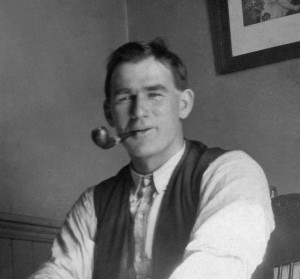
Louis Espagnol, the Native manager of the Hudson’s Bay Post and chief of one of the Spanish River bands was the predominant individual in the mid-19th century at Pogamasing. The honour of this distinction for the early 20th century would go to Bill Plaunt. The two men came from two vastly different worlds, one being an Anishnabe chief, the other a lumberman. Despite their very different appearances and backgrounds, they shared some commonalities. They both made their living from the forests. They were assertive and capable leaders in their businesses. They were strong family men who also demonstrated an enduring concern for the welfare of those they were responsible for. And they both made Pogamasing their seasonal home.
Plaunt came from a farming community west of the Renfrew and started in the lumber industry at a time when working in the bush was a natural complement to farming. After working with his father until he was 19, he moved to Blind River to work in the lumber business. It was here that he met Mildred Hicks and they married after she graduated from nursing in 1912. That same year, Plaunt started working for the Harris Tie and Timber Company owned by his cousin, F.X. Plaunt of Ottawa. In 1919 he established a new partnership with Ed White of Sudbury to cut pulp in six townships surrounding Duke Lake, the headwaters of the east branch of the Spanish River.
After ten years of cutting pulp on this limit, Plaunt began to look for a way to utilize the substantial jack pine stands that were not needed for the pulp contract. He secured a contract to supply railway ties to the CPR and then searched for a place on the Spanish River where he could drive the jack pine to a mill site close to the CP line. This brought him to the stop at Wye, alongside the Spanish River, and a short distance from Lake Pogamasing.
Plaunt bought the timber rights for the area, built a mill, established logging camps and created a village consisting of a school, store and office, and homes for his employees. But just as he became established, the stock market crashed and Plaunt, now on his own as his partner wanted out, had to find a way to survive the severe economic downturn. When he lost the tie contract with the CPR he approached Inco in Sudbury to sell his ties as mining timbers. When they rejected his offer, he went to the head office in New York and returned home with a bigger contract.
There is much I could say about my grandfather, but I will focus on a couple of defining characteristics. The first was his mathematical acumen, a critical skill in lumbering. His son, Bill, who later became a partner in the business, explained his innate ability. “One time I timber cruised with him just after I got out of school. At that time you had to estimate the amount of red and white pine that was in the limit. So, we would start out first thing in the morning. Dad knew exactly where he was going from his map, but he didn’t take it with him. He would look at it in the morning, and then we’d walk all day, maybe four to six miles in one direction, and then he would walk two to three miles in another direction….When he got home he would draw a map of where he had been. He would dictate numbers from memory to me and when I’d finish multiplying the numbers out on paper, he’d give me his answer from calculating in his head. It would be only different by a few numbers in the tens digits.”
To survive in this difficult economy Plaunt had to be a top-notch businessman, and he used methods not common to those who were more inclined to make profits for themselves. “Dad had a system that was added to what the men made. He used to say in the fall how much he wanted to make for the jack pine logs, white pine and so on. Anything over that was split among the men, not the foremen, but the men. And quite often they made as much in the bonus as they got in their salary. And they all knew it. The same guys worked for us year after year. 99% of those guys who went in the fall came out in March and in a 150-man camp it maybe only changed two or three men each year. We had the same teamsters for ten years.”
His business acumen went beyond lumbering and in the 1950’s he formed a partnership with George Miller and James Cooper to buy the Sudbury Star and CKSO radio, and eventually established the first independent television station in Canada.


{ 5 comments… read them below or add one }
Hi Andy I am a granddaughter of Robert McLean Plaunt of Earlton. Armstrong Twp. He was a brother of William Bell Plaunt. I am fascinated by your information on your family in and around the Sudbury area. I would be interested in getting a copy of your book/ books. Where can I obtain them? Please advise
I worked for Bill Plaunt on the KVP logging limit north of Espanola in 1966. The logging camp was on ‘skids’ -large trees cut so they could be dragged by dozer from place to place. The camp was run by an ex German U boat commander who had two Shepard dogs. The camp used 45 gallon drums with holes cut in them to heat the units. It was certainly the Canadian wilderness for a newly minted forester from Scotland
Thanks for your response. I only visited that camp once to deliver a truck for another uncle, Barry Benness, who managed the camp.
My grandmother, Christine Mulligan (Geo./Joe)was the youngest sister of Ed White. Her husband Joe managed a lumber camp which I think may have been at Pogamasing in the 1920s, early 30s. I grew up hearing stories of the lumber camp and of my mother and brother attending school a few days a month in a rail car (Wye siding) I always thought it was Y siding as I never saw it spelled out.
Would be interested in getting a copy of your book.
My apologies for not replying sooner but my server failed to notify me of your message.
The only Joe that was associated with my grandfather’s mill was his brother, Joe Plaunt, who was in charge of the Wye mill. Ed White was my grandfather’s partner until he sold his portion of the company in the early thirties due to his concern for the economy, although the name of the company retained his name. There was a one-room school at Wye but I am unsure if there ever was a school car there.
The book sells for $30 plus postal fees which is usually between $15-20, depending on where you live.
Andy